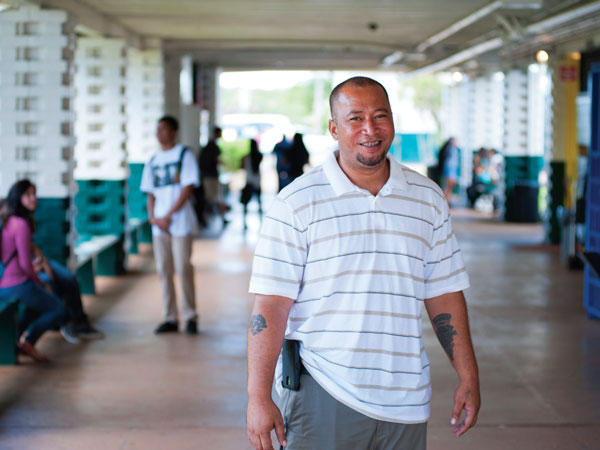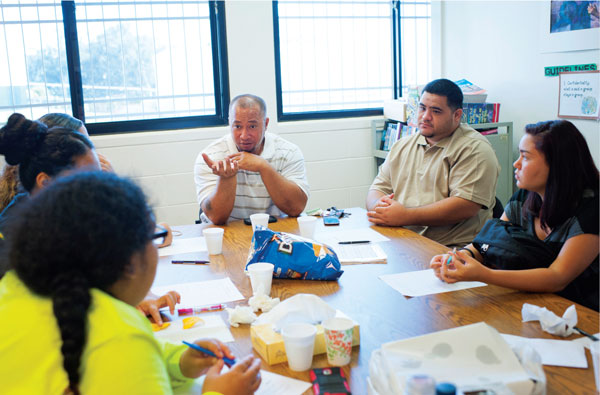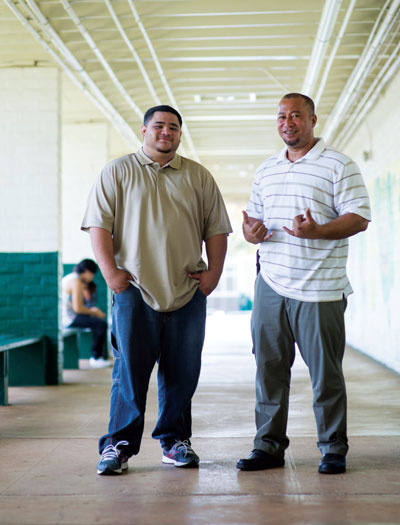A SINGLE PERSON CAN SAVE YOUR LIFE
Deborah Spencer-Chun never gave up on Mo Maumalanga, from middle school through his darkest days in prison. Today, it is Mo who is saving kids from the bad choices that ruin their lives.

Everyone calls him Mo, this muscular, tough-looking social worker who is respected by the teens and tweens he works with and by their parents.
His door is never closed. His cell phone is never off. At 2 in the morning, he’ll answer a call, show up on a doorstep to cool tempers or stop a fight, then mediate to calm a brewing turf war between rival gangs.
Mo has dedicated his life to troubled kids. Maybe that’s because he was once one of them.
“Every generation is the same thing. … My feelings were the same. My mentality was the same. Hate. I see it in the kids I work with and it’s like looking in a mirror. It looks like me when I was there.”
Today, Malakai “Mo” Maumalanga holds both bachelor’s and master’s degrees in social work, plus an AA degree. He’s a highly respected professional in his field and a man admired by youth, parents, community leaders and school officials.
He’s also proof that lives can be saved – by caring individuals, by intervention techniques and by programs that go the distance and never give up.
Hate. I see it in the kids I work with and it’s like looking in a mirror. It looks like me when I was there.”
In the mid-1990s, Mo was very different. After being involved in a drive-by shooting and then convicted on a firearm charge, he spent five years off and on in prison. At Terminal Island federal prison in Los Angeles, he saw two inmates killed while they slept. “After that I didn’t sleep at night,” he says. “You adjust.”
When Mo was released from prison in 2001, life was just as hard. Jobs were scarce for someone with a record and little education, and it was easy to remember how welcoming your old gang feels, especially if you’ve been part of it since 7th or 8th grade.
Everybody had given up on me. But Deb and Mac, our supervisors, didn’t give up no matter how many mistakes I made.”
Even his family had given up on him, he says.
“My Dad said, ‘You did this – it’s the life you chose. It was that old school ‘tough love’ thing. I never saw him cry in my life ’til someone shot up my house. I came home and he was sitting in the dark crying.”
Mo credits his turnaround to a social worker who never gave up. Without that positive, ongoing intervention, he says, he might never have taken a new course.
“She was my lifeline,” he says of social worker Deborah Spencer-Chun, who has been with Adult Friends for Youth for more than two decades and is now CEO. On the night in prison when he watched two other inmates killed, he reached out to Spencer-Chun.

In his darkest days, he would make a collect call to her office in Hawaii and she always took the call. Even before he was moved to a mainland prison, it was Deb who visited each week at his Hawaii prison.
“I was contemplating suicide because I thought I would never get out, and she told me ‘Just hang in there.’ … That I cannot be thinking just about myself only. Lucky I listened.”
Mo had been a gang member since he was 12. His family, recent immigrants from Tonga, struggled to survive and both parents worked two jobs. As he got older, he was often on his own. It was an easy step to becoming involved with a gang.
“We were all from the same neighborhood,” he says of his fellow gang members. “We were being bullied and picked on by the Mayor Wright housing ‘Bloods.’ I saw one (of our guys) getting beaten up and I jumped in and that’s how we became friends. That’s the whole gang concept, friendship. You get sucked into the negative and then it becomes part of the lifestyle. Before you know it, you hate the whole world. We beat up two of my cousins and put them in the hospital, just for the love of friends. When you’re in the lifestyle, the consequences don’t matter. You do first and think later. Twenty years later, I hear the same thing in the kids I work with.”
His backward slide was stopped by Spencer-Chun, who’s been working with him since he was in middle school. That effort never stopped – in high school, after he left school or even when he went to prison.
“It was a leap of faith for Deb,” Mo says now. “Everybody had given up on me. But Deb and Mac, our supervisors, didn’t give up no matter how many mistakes I made. They were there. They saw something in me that I didn’t see. I was ashamed of making the wrong decisions because of all the time they’d put into me. They never judged me as a monster. That was my reputation. That was my self-image, too. I didn’t see it change until I started working with the kids.”

Spencer-Chun and McKay “Mac” Schwenke have been the long-time social workers at Adult Friends For Youth, a program that has worked with some of Hawaii’s toughest kids for almost a quarter century. Today, among its programs is a chance for dropouts to earn high school diplomas with the help of supportive tutors.
AFY redirects young people from poor choices to better ones, and offers love and hope. It has been an important player over the past two decades in defusing gang activities in low-income Hawaii neighborhoods, and inspiring troubled kids to do something better with their lives. The successes are legion.
“We’re getting more and more of our kids into college,” Mo says. “We just had a group we followed from 8th grade through high school graduation and they’re all doing good. Some are in college now.”
Now, Mo works for AFY and offers the same lifeline to kids that Deb, Mac and AFY founder Sid Rosen offered to him.
“If you believe in me, I can grasp that and hold onto that,” Mo says. “Deb and Sid believed in me so much, but for the longest time I couldn’t see it. But I respected them enough and loved them enough and they were providing hope. All these kids want hope. The fear of going out and not making it overrides everything else.”
This handful of social workers has proven over and over that a single caring individual can turn a life around.
“We challenge the mentality of the groups we work with,” says Mo. “We plant the seed to change the mindset. The strength of working with the group is not just to deal with problems, but for them to find new ways to cope with their issues, so they don’t have to punch guys out. Once you get them to commit to change, they’ll do it because they’ve given their word.
“Ideally, if we can catch them at intermediate school, and follow them, we can get them through (high school).”